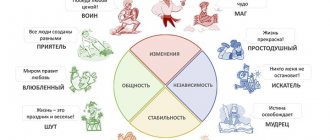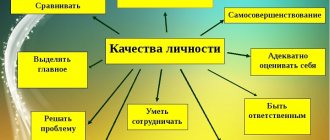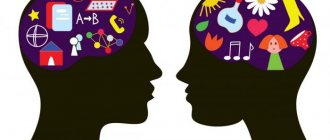The “golden” rule of communication is this: treat others as you would like them to treat you. However, the “platinum” rule for successful interpersonal communication is: treat others as they themselves want to be treated. Following this rule creates good opportunities for achieving success in any form of influence: actual management, manipulation, influence and even pressure.
However, to follow this rule, you need to understand what a person wants, what his true motivation is. It's not that simple: people use various means to hide a lot of things. In addition, a person often simply cannot give information about himself because he does not know himself.
Whatever a person is, he hides something about himself, weakens something, strengthens something, denies some information about himself, replaces something (especially with regard to incentives for activity), and simply ascribes something to himself (invents), emphasizes something. Taking advantage of all this, people often show themselves to society as they would like others to see them.
The key to the technology of professional psychological influence is knowledge of the psychology of individual differences. This is a very developed branch of psychological science. Here we will outline only some fundamental approaches to the use of individual differences in management.
In order to streamline the consideration of the possibilities of taking into account individual characteristics in management, it is advisable to return to the typology of value orientations, which was used in the context of assessing the personal potential of management. It should immediately be noted that there are types of individuals who are inclined to manage and who are inclined to be managed, although under certain conditions, as proponents of the theory of situational leadership claim, almost everyone can prove themselves as a leader. Nevertheless, people with greater personal management potential, other characteristics being equal (competence, for example), are more likely to occupy a dominant position in the group.
According to the Spranger-Holland system, several consistently manifested observable qualities of different types of people can be identified. The following analysis of different personality types will help you better understand other people, as well as determine the most effective ways to influence them.
Tables 1-6 present consistently manifested observable qualities of various types of people according to the Spranger-Holland system.
Conventional personality type
Systematic, conscientious and practical people who love to structure work, systematize information, and organize processes. They prefer to work according to instructions, think in stereotypes, and follow traditions. Conservatives can realize themselves in such professions as accountant, secretary, economist.
There are many other theories about personality types in the world where you can learn a lot more about yourself. If you want to delve even further into this topic, check out the free online course “Personality Typology.”
Content
- 1 Realistic type
- 2 Social type
- 3 Artistic type
- 4 Conventional type
- 5 Enterprising type
- 6 Intelligent type
American psychologist J. Holland proposed a classification of personality types based on which areas of professional activity a person is most likely to achieve the greatest success due to certain personal characteristics. In total, they were identified with six personality types:
- realistic
- artistic
- intellectual
- conventional
- enterprising
- social.
In real life, people who could be classified strictly as a certain type are extremely rare. Most often, a person has traits of two or even three types. Then they talk about the predominant type or several types. J. Holland's questionnaire allows a person to determine the predominant personality type, and therefore, understand which areas of activity are more effective for him.
Multiple Intelligences
Intelligence in Gardner's theory is more than just memorizing or solving logical problems. He views it as an ability, a set of skills that we are best at.
Basic postulates of the theory
Gardner believes that traditional psychometric views of intelligence are too narrow. All people have different types of intelligence. To capture the full range of abilities and talents that people possess, Gardner divided intelligence into nine types:
Each person has one type of intelligence predominant, but at the same time, several others can also be well developed. For example: your predominant intellect is naturalistic, but you have developed intrapersonal abilities.
Recognition and criticism
Of course, like any innovative, non-standard thinking, Gardner's theory is subject to criticism, mainly from psychologists. They argue that Gardner's definition of intelligence is too broad and that his nine types of intelligence are simply talents, personality traits, and abilities. Despite this, it is popular, for example in the field of education, because it confirms the everyday experience of educators: pupils and students do think and learn differently. And, accordingly, many teachers use this method for an individual approach to pupils and students.
Next, we will analyze in more detail the main characteristics corresponding to each type of intelligence, in order to understand which profession or type of activity suits you best.
Types of intelligence according to Gardner's theory and corresponding professions
1. Visual-spatial intelligence
The ability to create 3D models in your head, solving a geometric problem or mentally drawing three-dimensional images, is characteristic of people with visual-spatial intelligence.
Strengths: creation of visual and spatial images, easy manipulation of them.
Characteristics of a person:
- a penchant for drawing and drawing;
- ability to understand and interpret pictures, graphs and diagrams well;
- ability to remember maps well and navigate the terrain.
Potential Career:
- architect;
- artist;
- engineer;
- geologist.
2. Linguistic-verbal intelligence
This type of intelligence refers to a person's ability to effectively use their speech to express what they want to convey to their interlocutor or audience.
Strengths: eloquence, ability to lead a discussion, oratory skills, effective work with information, rapid learning of languages and writing.
Characteristics of a person:
- ability to memorize written and oral information;
- a penchant for reading and the ability to write interesting texts;
- ability to deliver persuasive speeches and explain clearly;
- ability to present information in a compelling way using humor and real-life stories.
Potential Career:
- writer, journalist, TV presenter;
- lawyer;
- teacher;
- politician.
3. Logical-mathematical intelligence
Logical and mathematical abilities are taken into account when determining intelligence using a standard IQ test. In Gardner's theory, this is just one type of intelligence.
Strengths: ability to find patterns and analyze available information, conceptual thinking and quick solution of mathematical problems.
Characteristics of a person:
- excellent problem solving skills;
- abstract thinking ( abstraction is the process of eliminating and separating what is unimportant at the moment in order to see the main thing);
- tendency to conduct scientific experiments;
- ability to do complex calculations.
Potential Career:
- programmer;
- scientist;
- mathematician;
- engineer;
- accountant.
4. Bodily-kinesthetic intelligence
High coordination of mind and body is characteristic of people with bodily-kinesthetic intelligence.
Strengths: high physical activity, precise coordination of movements, dexterity, tactile memory.
Characteristics of a person:
- sportiness, excellent sense of rhythm;
- penchant for handicrafts;
- excellent physical coordination;
- physical endurance.
Potential Career:
- athlete;
- dancer;
- sculptor;
- actor.
Musical intelligence
If a person has the ability to distinguish tempo, rhythm, timbre, keys and notes, then he has musical intelligence. This type of intelligence allows you to feel, reproduce and create musical works.
Strengths: sense of rhythm, hearing and musical talent.
Characteristics of a person:
- a penchant for singing and playing musical instruments;
- the ability to easily guess musical compositions;
- good memorization of songs and melodies;
- understanding of musical structure, rhythm and notes.
Potential Career:
- musician;
- composer;
- singer;
- music teacher.
Interpersonal intelligence
Emotions are closely related to your intelligence. Interpersonal intelligence refers to the ability to sense other people's feelings and understand the motives behind their behavior.
Strengths: influencing people, empathy , cognitive empathy, and interacting with others.
Empathy is the ability to understand and respond to the psycho-emotional background of complete strangers. Cognitive (cognitive) empathy is characteristic of politicians.
Characteristics of a person:
- the ability to evaluate the emotions, motives, desires and intentions of others;
- high communication skills;
- developed skills in nonverbal communication ( Nonverbal communication (body language) is communication interaction between people without the use of speech (transfer of information or influence of a person or group of people through images, intonation, gestures, facial expressions, pantomime, changing the vector of communication );
- the ability to see situations from different points of view;
- ability to build positive relationships with others and resolve conflicts.
Potential Career:
- psychologist;
- consultant;
- coach;
- salesman;
- politician.
7. Intrapersonal
Self-awareness is also a form of intelligence. If a person understands and adequately evaluates himself, his abilities, his desires, knows what he feels and why he feels it, then we can confidently say that he has intrapersonal intelligence. Usually such people have a strong character and achieve success in life.
The main thing in this type of intelligence is self-knowledge. All his life a person studies himself, the motivation of his actions, and also analyzes their consequences and results. This helps to understand in which direction the individual should develop. Those who know themselves deeply and objectively assess their potential are able to set goals and priorities correctly and achieve them based on their capabilities.
The process of self-knowledge and self-improvement lasts a lifetime. Only by knowing his strengths and weaknesses, sincere desires, abilities, and motivating himself, does a person move forward - towards the intended goal, and achieve success. Because accumulating knowledge about yourself without personality development is meaningless.
People with this type of intelligence know what they want and how to achieve it. They cope with stress, do not have conflicts, are calm, and easily find a common language with people of different ages and social strata.
Strengths: Introspection and self-reflection.
Characteristics of a person of this type of intelligence:
- the ability to understand your strengths and weaknesses well;
- tendency to analyze theories and ideas;
- excellent self-awareness, desire for self-knowledge and self-improvement
- a clear assessment of your emotional state.
Potential Career:
- businessman, entrepreneur;
- philosopher;
- writer;
- scientist.
8. Naturalistic intelligence
The ability to “read” and understand nature in all its diversity and all living creatures that inhabit it is the main characteristic of naturalistic intelligence.
Strengths: Ability to study and deeply understand the environment.
Characteristics of a person:
- interest in disciplines such as botany, biology and zoology;
- ability to break information into categories;
- enjoying: gardening, hiking and being outdoors;
- tendency to be interested exclusively in nature, craving for nature.
Potential Career:
- biologist;
- environmental activities;
- gardener;
- farmer.
Existential Intelligence
“What is the meaning of life?”, “What happens to us after death?” - these are typical questions for a person with existential intelligence. Strengths: deep sensitivity and high ability to find answers to fundamental questions about the existence of humanity and its place in the universe.
Characteristics of a person:
- desire to search for answers to questions about the meaning of life;
- tendency to think and reason;
- tendency to debate and argue;
- craving for the study of philosophical concepts.
Potential Career:
- philosopher
- historian
- psychoanalyst;
- religious figure;
Conclusion
Howard Gardner's theory of multiple intelligences has both supporters and opponents. However, its usefulness in identifying skills and talents cannot be denied. Multiple intelligence tests allow you to understand your strengths, choose the right direction in your career and the area in which you will be interested in developing and achieving success. But most importantly, the theory shows the obvious thing - that intelligence is not limited to logical and analytical thinking. It's much more versatile.
Is it good or bad to be realistic?
There is no clear answer to this question; we can only highlight the positive and negative qualities of this characteristic. The advantages include a high level of responsibility. A person is capable of leadership because he is not afraid to make decisions. He is able to harmoniously establish life and career.
There are some shortcomings, including down-to-earthness, inability, and reluctance to dream or give free rein to the imagination. Not many people like to communicate with such a laconic interlocutor, from whom they have to forcefully extract information. In addition, realists are considered to be conservative. Abrupt changes are alien to them, incl. openings, relocations. They might be called boring.
The difference between a realist and an idealist
Learned helplessness - what is this condition?
It is worth noting who an idealist is and his differences from a realist. An idealist has a habit of embellishing certain events. Having met a person, he will give him non-existent positive character traits, excessive kindness, care and other qualities. A realist would be more likely to wait for evidence of such positive characteristics of a new acquaintance.
People with such contradictory character traits may have similar concepts, for example, about lying - lying is bad. However, realists understand that sometimes it is impossible to do without deception, when, like idealists, they are confident that lying is always a bad option.
To summarize, the idealist believes in the idea itself. A realist will believe in it only when he sees the results.
How to raise a realistic child
Realists are not born. This quality is acquired over time and with experience. Although this trait can be cultivated from childhood, it should be observed in moderation. It is important for a child to develop harmoniously; fantasy is an integral stage of childhood and subsequent development. Thus, observing excessive idealism, children are gently lowered “from heaven to earth.”
There is a lot of debate about who this realist is, what kind of person he is. Some people consider such people to be boring and cold, unable to show emotions. At the same time, they are worthy leaders who confidently pursue goals. However, one cannot be so critical of realists, since they always have mixed character traits; their shortcomings are usually compensated for by other advantages.
Kinesthetic (bodily)
People with this type of thinking perceive the world through their body and can learn with its help. It helps them express their thoughts or attitude towards a subject. Individuals with kinesthetic intelligence move a lot, play sports, dance, and martial arts. They cannot sit still for a long time; they constantly need to do something.
They perfectly feel the space and objects around them, feel time. They stand out for their excellent physical shape and actively use spatial thinking.
Best professions:
- athlete;
- surgeon;
- choreographer;
- dancer;
- conductor;
- military;
- artist.
Such people were especially valued in Ancient Rome and Greece, where a beautiful athletic body was idolized. It was believed that a healthy body is the key to a healthy mind.
How to recognize a realist
Object of conflict - what is it?
A realist is a person who is confident in himself, has an unshakable opinion, he knows what he wants and how to get it. In the process of communication, he does not use expressions like “maybe”, “probably”, he allows himself to inform others about his capabilities regarding this or that phenomenon, excluding unnecessary fantasies and speculation.
The questions of who a woman realist is and what a man realist is require special attention.
Straightforwardness, rigor, loyalty and responsibility are the traits of a realist. Sometimes she is overly serious, but this makes her an irreplaceable, sympathetic friend. Men of the same character are usually pragmatists, they have developed strategy and practicality. They know the value of actions and things, the main thing is that they are not afraid of responsibility.
Responsibility as a positive quality
Features of communication with a realist
Having discovered that the interlocutor turned out to be a realist, you should not think that there should be a special attitude towards him. There is no point in arguing with such a person; you cannot impose your point of view on him if it does not coincide with the worldview of this realist. The main thing is not to burden him with empty talk. However, in close relationships, realists are trusting and value mutual understanding and comfort.
You should not expect from him all sorts of dramatic scenes with a showdown, as well as pleasant sudden surprises. This is a stable, constant and reliable person.
Gardner's theory
In 1994, psychologist Howarth Gardner created the theory of multiple intelligences. It has become an alternative to the classical view of the nature of intelligence, as an individual’s ability to think logically.
Gardner believed that it is the multiple nature of intelligence that allows an individual to choose a profession or hobby for which he has the most pronounced predisposition.
The psychologist described intelligence not as a specific device that is located in the head, but as a potential that allows a person to use all his abilities in a certain situation.
Gardner identifies 7 types of intelligence in psychology, which do not depend on one another and can exist as separate systems with their own rules. Over time, the theory was interpreted, refined, and several more types were added.
Highlight:
- natural (naturalistic);
- musical;
- logical-mathematical;
- existential (philosophical);
- kinesthetic (bodily);
- interpersonal (social);
- spatial (figurative);
- linguistic (verbal);
- personal (internal).
Gardner's theory allowed us to take a fresh look at the concept of talent, ability and intelligence. The psychologist argued that different people have different types of intelligence. Therefore, if at school some students have a penchant for exact sciences and are considered smart, and those who easily find a common language with other children are considered chatterboxes and slackers, then this is wrong. Different types of intelligence are in demand in different professions.
Interpersonal (social)
This is a pretty interesting type of thinking. Those with well-developed interpersonal intelligence are able to easily feel other people and have a high degree of empathy. It is typical for them to easily get along with new people, to be able to captivate them literally from the first word. They use different methods of communication: verbal and non-verbal.
They easily sense the mood of the interlocutor, so it is easy and pleasant to communicate with them. They often become leaders in the company, because they can understand those around them, help and always support others.
They like to be around other people, work with them, study, and be in constant contact. They easily understand the mood of the interlocutor, his needs and desires. They can explain the behavior of friends and acquaintances. They have a kind heart and often help others. They know how to control their own emotions.
Suitable professions:
- teacher or educator;
- psychologist;
- artist;
- HR specialist;
- Social worker.











